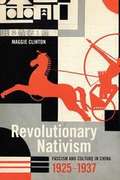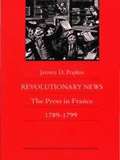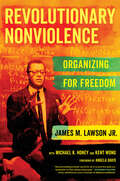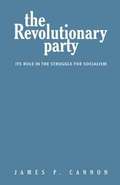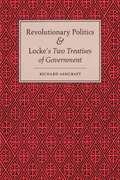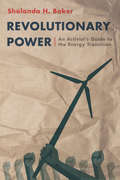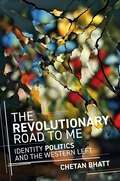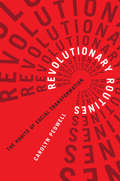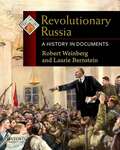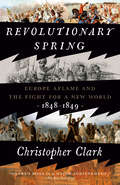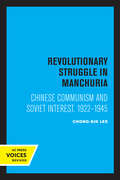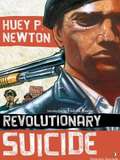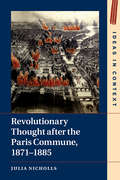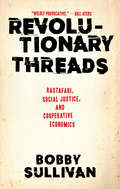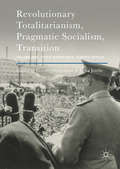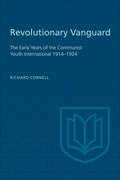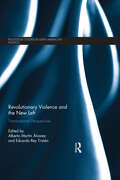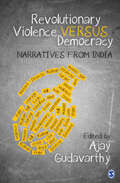- Table View
- List View
Revolutionary Nativism: Fascism and Culture in China, 1925-1937
by Maggie ClintonIn Revolutionary Nativism Maggie Clinton traces the history and cultural politics of fascist organizations that operated under the umbrella of the Chinese Nationalist Party (GMD) during the 1920s and 1930s. Clinton argues that fascism was not imported to China from Europe or Japan; rather it emerged from the charged social conditions that prevailed in the country's southern and coastal regions during the interwar period. These fascist groups were led by young militants who believed that reviving China's Confucian "national spirit" could foster the discipline and social cohesion necessary to defend China against imperialism and Communism and to develop formidable industrial and military capacities, thereby securing national strength in a competitive international arena. Fascists within the GMD deployed modernist aesthetics in their literature and art while justifying their anti-Communist violence with nativist discourse. Showing how the GMD's fascist factions popularized a virulently nationalist rhetoric that linked Confucianism with a specific path of industrial development, Clinton sheds new light on the complex dynamics of Chinese nationalism and modernity.
Revolutionary News: The Press in France, 1789–1799
by Jeremy PopkinThe newspaper press was an essential aspect of the political culture of the French Revolution. Revolutionary News highlights the most significant features of this press in clear and vivid language. It breaks new ground in examining not only the famous journalists but the obscure publishers and the anonymous readers of the Revolutionary newspapers. Popkin examines the way press reporting affected Revolutionary crises and the way in which radical journalists like Marat and the Pere Duchene used their papers to promote democracy.
Revolutionary Nonviolence: Organizing for Freedom
by James M. Lawson JrA persuasive account of the philosophy and power of nonviolence organizing, and a resource for building and sustaining effective social movements. Despite the rich history of nonviolent philosophy, many people today are unfamiliar with the basic principles and practices of nonviolence––even as these concepts have guided so many direct-action movements to overturn forms of racial apartheid, military and police violence, and dictatorships around the world. Revolutionary Nonviolence is a crucial resource on the long history of nonviolent philosophy through the teachings of Rev. James M. Lawson Jr., one of the great practitioners of revolution through deliberate and sustained nonviolence. His ongoing work demonstrates how we can overcome violence and oppression through organized direct action, presenting a powerful roadmap for a new generation of activists. Rev. Lawson’s work as a theologian, pastor, and social-change activist has inspired hope and liberation for more than sixty years. To hear and see him speak is to experience the power of the prophetic tradition in the African American and social gospel. In Revolutionary Nonviolence, Michael K. Honey and Kent Wong reflect on Rev. Lawson's talks and dialogues, from his speeches at the Nashville sit-in movement in 1960 to his lectures in the current UCLA curriculum. This volume provides a comprehensive introduction to Rev. Lawson's teachings on how to center nonviolence in successfully organizing for change.
Revolutionary Pairs: Marx and Engels, Lenin and Trotsky, Gandhi and Nehru, Mao and Zhou, Castro and Guevara
by Larry CeplairA political historian examines five of the twentieth century’s most significant revolutions, and the partnerships that led the way.Successful revolution requires two triggering elements: a crisis or conjuncture and revolutionary actors who are organized in a dedicated revolutionary party, armed with a radical ideology, and poised to act. While previous revolutions were ignited by small collectives, many in the twentieth century relied on strategic relationships between two exceptional leaders: Marx and Engels (Communism), Lenin and Trotsky (Russia), Ghandi and Nehru (India), Mao and Zhou (China), and Castro and Guevara (Cuba). These partnerships changed the world.In Revolutionary Pairs, Larry Ceplair tells the stories of five revolutionary struggles through the lens of famous duos. While each relationship was unique?Castro and Guevara bonded like brothers, Mao and Zhou like enemies?in every case, these leaders seized the opportunity for revolution and recognized they could not succeed without the other. The first cross-cultural exploration of revolutionary pairs, this book reveals the undeniable role of personality in modern political change.
The Revolutionary Party: Its Role in the Struggle for Socialism
by James P. CannonThe necessity of creating a leadership capable of carrying through to the end the struggle of working people to conquer power.
Revolutionary Passage: From Soviet To Post-Soviet Russia, 1985-2000
by Marc GarcelonRevolutionary Passage is a cultural, social, and political history of Russia during its critical period of transformation at the end of the twentieth century. Marc Garcelon traces the history of perestroika and the rise of Vladimir Putin, arguing that the pressure Mikhail Gorbachev's reforms put on the Soviet system gave birth to movements for democratic change. He also shows that the very political arrangements that prompted the fall of Communism also killed hopes for subsequent reform. At the turning point of this political revolution stood Democratic Russia, or DemRossiia, the principal organization of the Russian democratic movement that helped to dismantle the Soviet system and force the Soviet leadership to change course. However, as post-Soviet Russia committed itself to globalization and U. S. -style economic reforms, the country directed itself away from the Democratic reforms called for by organizations like DemRossiia, and such groups collapsed. Revolutionary Passage provides a close examination of the DemRossiia. Garcelon deftly illuminates the rise and decline of this organization, and how the processes of revolutionary change impacted both Russia and the world.
Revolutionary Politics And Locke's Two Treatises Of Government
by Richard AshcraftRichard Ashcraft offers a new interpretation of the political thought of John Locke by viewing his ideas, especially those in the Two Treatises of Government, in the context of his political activity. Linking the implications of Locke's political theory with his practical politics, Professor Ashcraft focuses on Locke's involvement with the radical Whigs, who challenged the established order in England from the 1670s to the 1690s. An equally important aim of the author is to provide a case study of a revolutionary movement that includes a discussion of its organization, ideology, socio-economic composition, and political activities. Based upon a detailed examination of manuscripts, diaries, correspondence, and newspapers, Professor Ashcraft presents a wealth of new historical evidence on the political life of Restoration England. This study represents an example of an approach to political theory that stresses the importance of authorial intentions and of the political, social, and economic influences that structure a particular political debate.
Revolutionary Politics and Locke's Two Treatises of Government
by Richard AshcraftRichard Ashcraft offers a new interpretation of the political thought of John Locke by viewing his ideas, especially those in the Two Treatises of Government, in the context of his political activity. Linking the implications of Locke's political theory with his practical politics, Professor Ashcraft focuses on Locke's involvement with the radical Whigs, who challenged the established order in England from the 1670s to the 1690s. An equally important aim of the author is to provide a case study of a revolutionary movement that includes a discussion of its organization, ideology, socio-economic composition, and political activities. Based upon a detailed examination of manuscripts, diaries, correspondence, and newspapers, Professor Ashcraft presents a wealth of new historical evidence on the political life of Restoration England. This study represents an example of an approach to political theory that stresses the importance of authorial intentions and of the political, social, and economic influences that structure a particular political debate.
Revolutionary Power: An Activist's Guide to the Energy Transition
by Shalanda BakerIn September 2017, Hurricane Maria hit Puerto Rico, completely upending the energy grid of the small island. The nearly year-long power outage that followed vividly shows how the new climate reality intersects with race and access to energy. The island is home to brown and black US citizens who lack the political power of those living in the continental US. As the world continues to warm and storms like Maria become more commonplace, it is critical that we rethink our current energy system to enable reliable, locally produced, and locally controlled energy without replicating the current structures of power and control.In Revolutionary Power, Shalanda Baker arms those made most vulnerable by our current energy system with the tools they need to remake the system in the service of their humanity. She argues that people of color, poor people, and indigenous people must engage in the creation of the new energy system in order to upend the unequal power dynamics of the current system.Revolutionary Power is a playbook for the energy transformation complete with a step-by-step analysis of the key energy policy areas that are ripe for intervention. Baker tells the stories of those who have been left behind in our current system and those who are working to be architects of a more just system. She draws from her experience as an energy-justice advocate, a lawyer, and a queer woman of color to inspire activists working to build our new energy system.Climate change will force us to rethink the way we generate and distribute energy and regulate the system. But how much are we willing to change the system? This unique moment in history provides an unprecedented opening for a deeper transformation of the energy system, and thus, an opportunity to transform society. Revolutionary Power shows us how.
Revolutionary Prophecies: The Founders and America’s Future (Jeffersonian America)
by Joanne B. FreemanThe America of the early republic was built on an experiment, a hopeful prophecy that would only be fulfilled if an enlightened people could find its way through its past and into a future. Americans recognized that its promises would only be fully redeemed at a future date. In Revolutionary Prophecies, renowned historians Robert M. S. McDonald and Peter S. Onuf summon a diverse cast of characters from the founding generation—all of whom, in different ways, reveal how their understanding of the past and present shaped hopes, ambitions, and anxieties for or about the future. The essays in this wide-ranging volume explore the historical consciousness of Americans caught up in the Revolution and its aftermath. By focusing on how various individuals and groups envisioned their future, the contributors show that revolutionary Americans knew they were making choices that would redirect the "course of human events." Looking at prominent leaders such as Washington, Adams, Franklin, Hamilton, Madison, and Monroe, as well as more common people, from backcountry rebels and American Indians to printer Isaiah Thomas, the authors illuminate the range and complexity of the ways in which men and women of the founding generation imagined their future—and made our history.
Revolutionary Republicanism: Participation and Representation in 1848 France (Routledge Studies in Radical History and Politics)
by Samuel HayatRevolutionary Republicanism provides a history of French republicanism seen through a seminal episode of its creation – the 1848 revolution. The process of reinventing republicanism in 1848 gave rise to two opposite understandings of republicanism: a moderate one that merely adapted the institutions of representative government to popular sovereignty, and a more radical, ‘social- democratic’ notion of republicanism, based on inclusive forms of representation and aiming at the emancipation of the proletariat. These two notions of republicanism unfolded over the course of the few critical months between the revolution of February 1848 and the uprising of June 1848, which saw the victory of the moderate one. Playing devil’s advocate to the traditional republican history that casts 1848 as a mere step in the continuous history of French republicanism, the book demonstrates that the events of the revolution amounted to a repression of all that the ‘Republic’ had meant up until that point, particularly the forms of participation and popular representation hitherto seen as constituting a republican regime. The text also sets out to chart the history of the ‘democratic and social Republic’, as the socialist and worker revolutionaries of 1848 called the radical republicanism they dreamed of founding and believed would fulfil the republican promise of emancipation. This book will appeal to all those with an interest in the French revolutions, and the history of radical ideas.
The Revolutionary Road to Me: Identity Politics and the Western Left
by Chetan BhattHow can the left be credible when it can’t decide what a woman is? How can antiracists fight for equality if they promote fictions about race? If identity politics is the answer, why are so many Western left organizations being damaged by it? As the culture wars rage, this compelling book examines why much of the Western political left has foundered because of identity politics. Identity issues have mired many good organizations in intractable conflicts and deflected them from their purpose. In ignoring poverty and inequality, the Western left has lost its way. Meanwhile, powerful social movements from the past – black, women’s, gay, and lesbian – are reduced to corporate slogans. Attuned to the needs of activists and academics, this book offers intelligent explanations for how we got here. It examines serious problems with antiracism, transgender rights activism, and the work of LGBTQ+ groups. In showing how identities are outcomes of social and institutional forces, it argues that technofinancial capitalism uses identity politics to mould new labour processes for the Western middle class while accelerating economic inequality. Clearing a path through the vagaries of identity politics, the book offers arguments the Western left must face amidst formidable far-right and right-wing authoritarianism, climate emergency, and severe inequalities.
Revolutionary Routines: The Habits of Social Transformation (Outspoken)
by Carolyn PedwellAlthough we tend to associate social transformation with major events, historical turning points, or revolutionary upheaval, Revolutionary Routines argues that seemingly minor everyday habits are the key to meaningful change.Through its account of influential socio-political processes – such as the resurgence of fascism and white supremacy, the crafting of new technologies of governance, and the operation of digital media and algorithms – this book rethinks not only how change works, but also what counts as change. Drawing examples from the affective politics of Trumpism and Brexit, nudge theory and behaviour change, social media and the international refugee crisis, and the networked activism of Occupy and Black Lives Matter, Carolyn Pedwell argues that minor gestures may be as significant as major happenings, revealing the powerful potential in our ability to remake shared habits and imaginatively reinhabit everyday life.Revolutionary Routines offers a new understanding of the logics of habit and the nature of social change, power, and progressive politics, illustrating diverse forms of consciousness and co-operation through which political solidarities might take shape.
Revolutionary Russia: A History In Documents (Pages From History Ser.)
by Robert Weinberg Laurie BernsteinRevolutionary Russia: A History in Documents provides a visually stimulating survey of revolutionary Russia, from the collapse of the autocracy in 1917 to the consolidation of the Stalinist system in the 1930s. Authors Robert Weinberg and Laurie Bernstein have collected far-flung documents--many available in English for the first time--and woven them into a narrative that focuses on the effort to build communism in Russia and its effects on the lives of ordinary people. Providing introductions to each chapter and document along with sidebars and detailed photo captions, the main text tantalizes readers with the great vision, conflict, hopes, and horrors of this much-mythologized part of modern history, while the back matter offers resources for further exploration. Utilizing a mix of textual and visual documents-including photographs, posters, and objects-to create a textured history of revolutionary Russia, the book covers such diverse topics as the prelude to revolution, the Bolshevik rise to power, the fate of the royal family, peasant resistance to Bolshevik policies, Stalin's "revolution from above," and the Great Terror. A picture essay, featuring sixteen posters, provides a visual depiction of the impact of the revolution on women.
Revolutionary Social Work: Promoting Systemic Changes (Routledge Advances in Social Work)
by Masoud KamaliThis book shows how social work can be an active agent for promoting revolutionary changes in order to counter the global neoliberal market fundamentalism which is destroying our planet and reinforcing socioeconomic inequalities, political instability, antidemocratic political ideologies and movements, small wars, conflicts, racism and other forms of oppression. Providing case-studies from South Africa, Chile, Iran, Europe, Australia and the USA written by leading critical and radical social work scholars, it shed light on consequences of the global neoliberal racial capitalism and postcolonial oppression. By presenting innovative ideas and suggestions for a revolutionary social work aim at promoting systemic changes and eliminating the roots of social problems it will be of interest to all scholars and students of social work, community development and social justice more broadly.
Revolutionary Spring: Europe Aflame and the Fight for a New World, 1848-1849
by Christopher ClarkFrom the bestselling author of The Sleepwalkers comes an epic history of the 1848 revolutions that swept Europe, and the charismatic figures who propelled them forward—&“a beautifully written, richly detailed account of a historical moment that rhymes and resonates, in many strange ways, with our own era of turmoil and disruption&” (Amitav Ghosh, author of Sea of Poppies).As history, the uprisings of 1848 have long been overshadowed by the French Revolution of 1789 and the Russian revolutions of the early twentieth century. And yet in 1848 nearly all of Europe was aflame with conflict. Parallel political tumults spread like brush fire across the entire continent, leading to significant changes that continue to shape our world today. These battles for the future were fought with one eye kept squarely on the past: The men and women of 1848 saw the urgent challenges of their world as shaped profoundly by the past, and saw themselves as inheritors of a revolutionary tradition.Celebrated Cambridge historian Christopher Clark describes 1848 as &“the particle collision chamber at the center of the European nineteenth century,&” a moment when political movements and ideas—from socialism and democratic radicalism to liberalism, nationalism, corporatism, and conservatism—were tested and transformed. The insurgents asked questions that sound modern to our ears: What happens when demands for political or economic liberty conflict with demands for social rights? How do we reconcile representative and direct forms of democracy? How is capitalism connected to social inequality? The revolutions of 1848 were short-lived, but their impact on public life and political thought throughout Europe and beyond has been profound.Meticulously researched, elegantly written, and filled with a cast of charismatic figures, including the social theorist Alexis de Tocqueville, the writer George Sand, and the troubled priest Félicité de Lamennais, who struggled to reconcile his faith with politics, Revolutionary Spring offers a new understanding of 1848 that suggests chilling parallels to our present moment. &“Looking back at the revolutions from the end of the first quarter of the twenty-first century, it is impossible not to be struck by the resonances,&” Clark writes. &“If a revolution is coming for us, it may look something like 1848.&”
Revolutionary Struggle in Manchuria: Chinese Communism and Soviet Interest, 1922 - 1945
by Chong-Sik LeeThis title is part of UC Press's Voices Revived program, which commemorates University of California Press’s mission to seek out and cultivate the brightest minds and give them voice, reach, and impact. Drawing on a backlist dating to 1893, Voices Revived makes high-quality, peer-reviewed scholarship accessible once again using print-on-demand technology. This title was originally published in 1983.
Revolutionary Subjectivity in Post-Marxist Thought: Laclau, Negri, Badiou (Rethinking Political and International Theory)
by Oliver HarrisonSince the onset of the Global Financial Crisis the ideas of Karl Marx have once again become prominent in social and political thought. This book turns to Marx’s theory of revolutionary subjectivity as a means of assessing the work of three contemporary global theorists: Ernesto Laclau, Antonio Negri, and Alain Badiou, considered here together for the first time.
Revolutionary Suicide: (Penguin Classics Deluxe Edition) (Penguin Classics Deluxe Edition)
by Newton Huey P.The searing, visionary memoir of founding Black Panther Huey P. Newton, in a dazzling graphic package Eloquently tracing the birth of a revolutionary, Huey P. Newton's famous and oft-quoted autobiography is as much a manifesto as a portrait of the inner circle of America's Black Panther Party. From Newton's impoverished childhood on the streets of Oakland to his adolescence and struggles with the system, from his role in the Black Panthers to his solitary confinement in the Alameda County Jail, Revolutionary Suicide is smart, unrepentant, and thought-provoking in its portrayal of inspired radicalism. .
Revolutionary Thought after the Paris Commune, 1871–1885 (Ideas in Context #120)
by Julia NichollsThis first comprehensive account of French revolutionary thought in the years between the crushing of France's last nineteenth-century revolution and the re-emergence of socialism as a meaningful electoral force offers new interpretations of the French revolutionary tradition. Drawing together material from Europe, North America, and the South Pacific, Julia Nicholls pieces together the nature and content of French revolutionary thought in this often overlooked era. She shows that this was an important and creative period, in which activists drew upon fresh ideas they encountered in exile across the world to rebuild a revolutionary movement that was both united and politically viable in the changed circumstances of France's new Third Republic. The relative success of these efforts, moreover, has significant implications for the ways in which we understand the founding years of the Third Republic, the nature of the modern revolutionary tradition, and the origins of European Marxism.
Revolutionary Threads: Rastafari, Social Justice, and Cooperative Economics
by Bobby SullivanAn American Rastafarian “offers a vibrant examination of American and African history with an anti-colonial patina . . . engaging” (Kirkus Reviews).Revolutionary Threads offers an American Rasta’s retelling of episodes in American history with an anticolonial thrust, accented by Bobby Sullivan’s own personal experiences. The book ties together various subjects while returning each time to the culture of Rastafari, social justice movements, and cooperative economics. From how we perceive history in general, America's precolonial past, and global capitalism’s early development and the resistance to it, to political prisoners and a celebration of religious tolerance, the book approaches North America with an African-centric perspective. Sullivan dispels the oversimplification of our perceptions of Rastafari, as well as other cultures, in the age of the Internet, where the loudest voices are often the most extreme and divisive. Revolutionary Threads aims to serve as a unifying agent for our all-too-connected global village, and for the resistance to the consolidation of global capital and all its excesses.“A post-hardcore rock star, community activist, and social justice intellectual offers an alternative look at countercolonial history through the lens of the Rastafari movement.” —Kirkus Reviews“Outlining his philosophical influences and backpacking through history and criss-crossing continental borders, Sullivan puts his enlightenment journey and way of life, which includes activism for social justice, prison outreach, and cooperative economics, on paper.” —The Gleaner (Jamaica)“[Sullivan] meticulously sources his work throughout, whether providing a Howard Zinn-like take on the settlement of America by Africans predating Columbus, or in discussing political prisoners like Marilyn Buck . . . an engaging, lively, well-thought book which provides a picture of Rastafarianism in action, for punks and beyond.” —Razorcake
Revolutionary Totalitarianism, Pragmatic Socialism, Transition
by Gorana Ognjenović Jasna JozelićThisvolume challenges decades of superficial and selective rhetoric about Tito's Yugoslaviathat came from different sides and political interests, foreign as well asdomestic. The essays are meant to fill in some ofthose black holes in some already existing descriptionsof Tito's Yugoslavia that unfortunately saw daylight and lived long andprosperous lives, longer than should have been the case. Contributors cover a range of topics including the abolition of themulti-party system, nonalignment, and the 1968 reinforcing position amongothers.
Revolutionary Vanguard: The Early Years of the Communist Youth International 1914-1924
by Richard CornellThe monolithic nature of the communist movement during the Stalinist period overlay pluralist tendencies. These were suppressed in the 1920s, though they were to re-emerge after Stalin's death.The history of the Communist Youth International is revealed in this volume as an important example of the 'autonomist' tendencies in the communist movement after the First World War. The experience of the CYI also demonstrates that differences between Leninist and Stalinist eras were of degree, rather than of kind. Under Lenin, organizational principles and practices were introduced that gave to the new communist movement a distinct, authoritarian cast.Cornell considers the relevance, in the development of radical movements among the young, of such qualities as untempered idealism, a predisposition to embrace the most radical alternatives for social change, and a self-assertiveness or rebelliousness directed against traditional adult teachings. He shows how these qualities were to lead, after the First World War (and more recently), to conflicts between radical, ideologically orthodox youth and more pragmatic adult party leaders. In introducing their new kind of radicalism, the young communists of Europe in 1919 considered themselves to be the most revolutionary element among revolutionaries – the highest form of 'revolutionary vanguard.' Moscow did not agree.
Revolutionary Violence and the New Left: Transnational Perspectives (Routledge Studies in Latin American Politics)
by Alberto Martin Alvarez Eduardo Rey TristánLeading figures and rising stars in the field present the first contribution explaining the transnational nature of the revolutionary violence of the New Left. Focusing on the processes of dissemination of ideologies and mobilization of ideas and repertoires of action among the revolutionary organizations of the New Left in Latin America, Europe, and the United States, this book contributes to our understanding of the dynamics of the New Left wave and, at the same time, helps explain the "why" of the emergence of very similar armed leftist groups in vastly different geographical and political contexts.
Revolutionary Violence Versus Democracy: Narratives from India
by Ajay GudavarthyThis book focuses on the interFace between democracy and violence, with specific reference to revolutionary strategies and mobilisations. Revolutionary Violence Versus Democracy: Narratives from India explores the armed conflict in India’s ‘Red Corridor’, where Maoists have been employing militant-revolutionary strategies to implement an alternative model of development. It studies this model, the purpose of which is to ensure the inclusion of impoverished tribals considered dispensable by mainstream political parties. Maoists feel that capture of State power is essential for revolution. State-sanctioned extra-judicial violence is common in the tribal belt—Maoists use strategies that challenge the State’s monopoly over the use of violence. This first-of-a-kind book reflects on revolutionary strategies, such as kidnaping, in terms of their validity in democratic mobilisation. Based on extensive field data, the chapters in this compilation discuss the everyday politics of Maoists and contemporary tribal society. Revolutionary violence is debated in the context of the limits of democracy and ineffective modes of governance.
